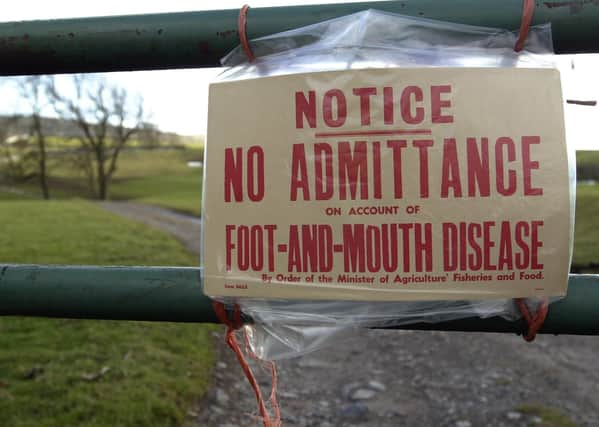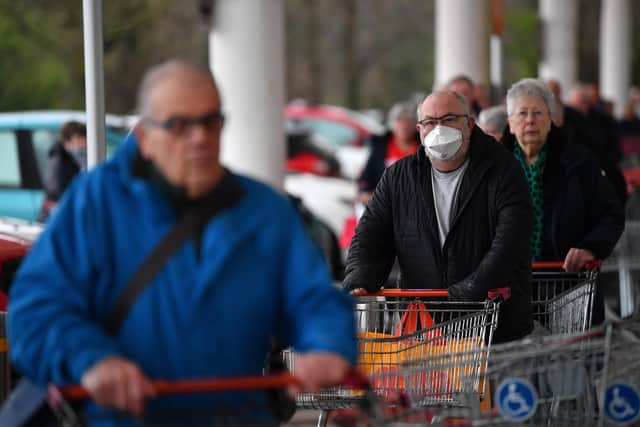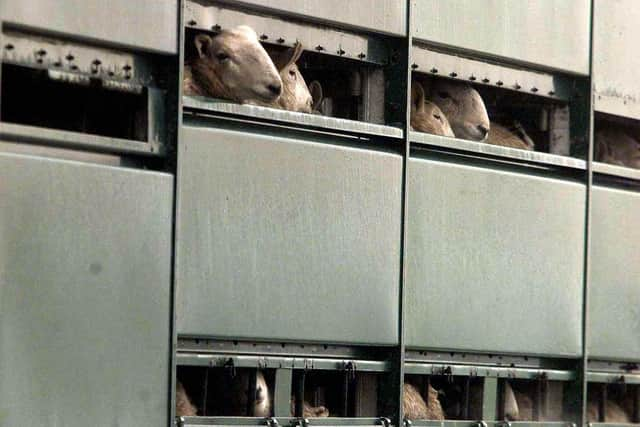These lessons from foot and mouth need heeding over Covid-19 – Chris Haskins


The enforced closure of hotels, restaurants, fast food outlets and school meals has exacerbated the problem. More than a third of food is distributed through these outlets and this market, now closed, has to be supplied through supermarkets.
The problem is that suppliers to food services cannot quickly switch over to selling to supermarkets. The products are different, the packaging is different and the distribution systems are not compatible.


Advertisement
Hide AdAdvertisement
Hide AdIn the short term, panic buying has already eased and supermarkets will bring pressure on their suppliers to substantially increase production. This can be done by increased productivity, longer hours and range rationalisation.
Meanwhile, suppliers to the food services sector will have to mothball many of their plants and distribution systems until the crisis is over. Even then, the pressure on incomes will mean that the leisure industries may take time to recover.
There may be some long term structural changes in the way food is sold, produced and distributed, but there will be plenty of food available – even if more people, unfortunately, have to rely on food banks. In theory, more business through supermarkets should benefit British farmers.
The UK is about 60 per cent self-sufficient in food. However, because of our climate, nearly three-quarters of the shortfall could not be produced here.


Advertisement
Hide AdAdvertisement
Hide AdThe labour intensive fruit and vegetable sectors in Britain are already being affected by Brexit because seasonal workers from Eastern Europe are no longer welcome here. The important asparagus market is now in danger for this reason. It is hoped that students and many of the freshly unemployed may in part reduce the shortfall in coming weeks.
I was heavily involved in the foot and mouth crisis of 2001. Many of the problems which arose then are reappearing in the present emergency, and it is depressing to observe lessons from then do not appear to have been learned.
First be prepared. We were not in 2001 and the same appears to apply in 2020. Foot and mouth spread very quickly and initially there was inadequate information to enable the Government to act; livestock was moving around the country through markets and spreading infection.
The lack of a comprehensive testing regime meant that outbreaks could not be controlled by isolating potential victims. After 2001, all cattle had to have a unique ear tag number which meant that in a future outbreak vulnerable animals could be quickly traced (the Chinese appear to have developed an electronic tracking system for their citizens, but civil rights champions are understandably queasy about such an approach here).


Advertisement
Hide AdAdvertisement
Hide AdEarly interventions are essential in controlling disease, but it can take time to solve the logistic problems. In 2001 the Army was brought in to speed up the disposal of slaughtered animals and to help to lock up farms.
Today some people suspect that the Government prevaricated for a couple of weeks before acting. However, there is a concern that if people are asked to remain at home for too long, they will get fed up and break the rules. I suspect that this happened with locked-up farmers who illegally moved cattle, thereby causing a prolonging of the foot and mouth crisis in North Yorkshire and Cumbria.
The most controversial policy of the Government in 2001 was to insist on the slaughter of every herd which incurred the infection. Vaccination had been used in other countries where foot and mouth was endemic, but the farmers insisted on the slaughter policy which they claimed was more effective and for which they were compensated.
Today, some weird and sinister theories that coronavirus should take its course – even if very large numbers of elderly people have to die – have fortunately been rejected, but, as yet, there is no effective vaccine. It may be several months before one is available. I understand that effective vaccinations are available if another foot and mouth outbreak was to occur.
Advertisement
Hide AdAdvertisement
Hide AdI’ve referred to the logistical problems of dealing with foot and mouth – testing, tracing, and disposal of dead animals. Today’s challenges are even more daunting – a shortage of beds, ventilators, testing equipment and even mortuaries. Much of the equipment should have already been in place, as appears to be the case in Germany but the creation, in a matter of weeks, of the largest hospital in Europe – the Nightingale in East London – is a remarkable achievement.
One of the most impressive aspects of 2001 was the extraordinary commitment of front line staff, especially the vets and those engaged with slaughtering and farm clean-ups, as well as the farmers themselves. The same is clearly happening today with the front line staff of the NHS.
Finally, there is the issue of decision-making, a highly centralised system operated at the then Ministry of Agriculture, Fisheries and Food in 2001, but in some cases over centralisation led to dangerous delays in taking action at local level when decisions could – and should – have been taken quickly. This may also a problem with the NHS, which is even more centralised and bureaucratic.
Credible leadership is essential if the public are to be asked to inconvenience themselves in order to help solve the crisis. Tony Blair had that credibility in 2001, but it remains to be seen if Boris Johnson succeeds in persuading the people to put up with quite severe restraints on their freedom over the longer term, if that is needed, to control the epidemic. We must hope so.
Advertisement
Hide AdAdvertisement
Hide AdChris Haskins is a farmer at Skidby. An entrepreneur, he was Tony Blair’s rural adviser at the time of the foot and mouth crisis.
Editor’s note: first and foremost - and rarely have I written down these words with more sincerity - I hope this finds you well.
Almost certainly you are here because you value the quality and the integrity of the journalism produced by The Yorkshire Post’s journalists - almost all of which live alongside you in Yorkshire, spending the wages they earn with Yorkshire businesses - who last year took this title to the industry watchdog’s Most Trusted Newspaper in Britain accolade.
And that is why I must make an urgent request of you: as advertising revenue declines, your support becomes evermore crucial to the maintenance of the journalistic standards expected of The Yorkshire Post. If you can, safely, please buy a paper or take up a subscription. We want to continue to make you proud of Yorkshire’s National Newspaper but we are going to need your help.
Advertisement
Hide AdAdvertisement
Hide AdPostal subscription copies can be ordered by calling 0330 4030066 or by emailing [email protected]. Vouchers, to be exchanged at retail sales outlets - our newsagents need you, too - can be subscribed to by contacting subscriptions on 0330 1235950 or by visiting www.localsubsplus.co.uk where you should select The Yorkshire Post from the list of titles available.
If you want to help right now, download our tablet app from the App / Play Stores. Every contribution you make helps to provide this county with the best regional journalism in the country.
Sincerely. Thank you.
James Mitchinson
Editor
